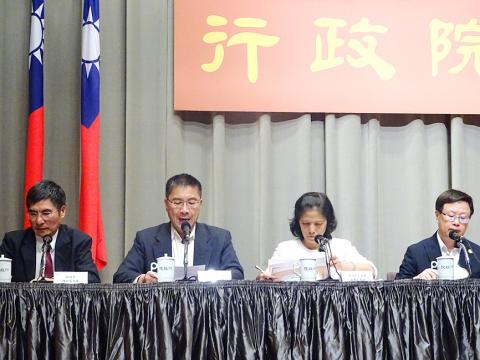The Cabinet has approved a five-year, NT$16 billion (US$528.66 million) budget to develop artificial intelligence (AI) to expand the nation’s technology start-up ecosystem and competitive edge.
The Ministry of Science and Technology submitted a plan to transform the nation into an AI hub by completing the digital infrastructure needed to develop AI technologies and creating an innovative ecosystem for established tech businesses and startups.
The ministry plans to allocate NT$5 billion over four years to build servers to provide a sharable high-speed cloud computing environment for AI developers.

Photo: Lee Hsin-fang, Taipei Times
That could help industries and researchers develop deep learning and big data analytics to nurture AI service providers and create a regional AI ecosystem, Minister of Science and Technology Chen Liang-gee (陳良基) said.
Another NT$5 billion is to be used to build a research and development center over five years to train AI engineers and apply AI technologies to practical use for society and culture.
To develop AI robotics, a four-year, NT$2 billion budget is earmarked for another research center to establish a testing ground for young engineers to experiment with their innovations and develop a domestic AI robotics industry.
The ministry has also launched a four-year, NT$4 billion “semiconductor moonshot program” to help the nation’s semiconductor industry to break through the bottleneck of AI technology.
The program is to train high-end engineers in designing chips and improving the manufacturing process to prepare the local industry for the onset of AI era, the ministry said.
To encourage public participation in AI development, the ministry is to hold a series of contests in which participants would be asked to find AI solutions to day-to-day problems.
The first contest would be developing an AI that could understand Chinese in daily scenarios, with a total prize of NT$30 million, with NT$20 million for the winning team.
Taiwan has a competitive edge in endpoint technology and devices, but Taiwanese companies have to collaborate with international tech giants such as Google, Microsoft and Facebook in cloud computing, Chen said.
Asked if a full-blown AI industry could result in mass unemployment, Chen said AI could be used to create more jobs.
“AI is as much a tool as the Internet and the computer. Certainly, some jobs have been replaced by the Internet, but many new jobs have also been created with the advent of new tools. That is why we need to master AI as soon as possible,” he said.
To prevent the criminal use of AI technology, experts in humanities and social sciences will be incorporated in the development of AI algorithms, Chen said.

A preclearance service to facilitate entry for people traveling to select airports in Japan would be available from Thursday next week to Feb. 25 at Taiwan Taoyuan International Airport, Taoyuan International Airport Corp (TIAC) said on Tuesday. The service was first made available to Taiwanese travelers throughout the winter vacation of 2024 and during the Lunar New Year holiday. In addition to flights to the Japanese cities of Hakodate, Asahikawa, Akita, Sendai, Niigata, Okayama, Takamatsu, Kumamoto and Kagoshima, the service would be available to travelers to Kobe and Oita. The service can be accessed by passengers of 15 flight routes operated by

GIVE AND TAKE: Blood demand continues to rise each year, while fewer young donors are available due to the nation’s falling birthrate, a doctor said Blood donors can redeem points earned from donations to obtain limited edition Formosan black bear travel mugs, the Kaohsiung Blood Center said yesterday, as it announced a goal of stocking 20,000 units of blood prior to the Lunar New Year. The last month of the lunar year is National Blood Donation Month, when local centers seek to stockpile blood for use during the Lunar New Year holiday. The blood demand in southern Taiwan — including Tainan and Kaohsiung, as well as Chiayi, Pingtung, Penghu and Taitung counties — is about 2,000 units per day, the center said. The donation campaign aims to boost

ENHANCING EFFICIENCY: The apron can accommodate 16 airplanes overnight at Taoyuan airport while work on the third runway continues, the transport minister said A new temporary overnight parking apron at Taiwan Taoyuan International Airport is to start operating on Friday next week to boost operational efficiency while the third runway is being constructed, the Ministry of Transportation and Communications said yesterday. The apron — one of the crucial projects in the construction of the third runway — can accommodate 16 aircraft overnight at the nation’s largest international airport, Minister of Transportation and Communications Chen Shih-kai (陳世凱) told reporters while inspecting the new facility yesterday morning. Aside from providing the airport operator with greater flexibility in aircraft parking during the third runway construction,

American climber Alex Honnold is to attempt a free climb of Taipei 101 today at 9am, with traffic closures around the skyscraper. To accommodate the climb attempt and filming, the Taipei Department of Transportation said traffic controls would be enforced around the Taipei 101 area. If weather conditions delay the climb, the restrictions would be pushed back to tomorrow. Traffic controls would be in place today from 7am to 11am around the Taipei 101 area, the department said. Songzhi Road would be fully closed in both directions between Songlian Road and Xinyi Road Sec 5, it said, adding that bidirectional traffic controls would